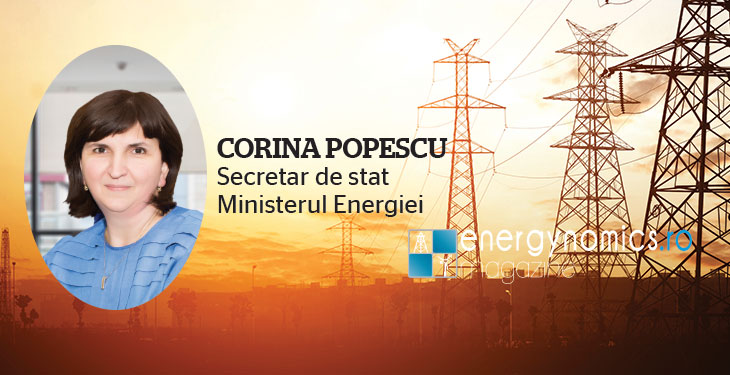The new management team from the Ministry of Energy is made up of experts with good experience in the industry, with practice in large companies and in relations with European institutions. Corina Popescu is Secretary of State with responsibilities in the electricity and mining sectors. We discussed about the priorities of her mandate and about objectives that Corina Popescu and the team she coordinates assumed for this year.
Dear Mrs. Corina Popescu, the electricity sector depends from a legislative point of view on the Parliament and in terms of regulations on ANRE. What’s left, as duties, in the task of the ministry and yours personally?
The Ministry of Energy primarily has a strategist role, that of giving directions in the national energy system. We have undertaken to update the National Energy Strategy, a document that must eventually be adopted by political parties. It’s important that all stakeholders contribute to the achievement and especially to undertake this document. In the past, strategies have been developed at ministry level but remained only a succession of projects put on paper and never supported and implemented.
We started from radiography of the existing situation and we are already working on concrete issues in teams well defined. If the strategy is approved in the Parliament, then we will really enter the right path. It is true that the strategy does not impose specific actions for any Government or company, but it comes with very useful signals for investment decisions in Romania. In principle, those interested in the energy sector analyze in general what are the public policies in the field and only then they research the legislation and the regulatory framework. All these levels are important, but what is essential is that all items are consistent with each other, to have logic.
There are many voices very skeptical about the efficiency of such a document. Specifically, it’s useless to undertake the support for a sector through the strategy if the regulator – for example, or the legislator is not going in the same direction. And then, why do we need the strategy?
ANRE’s role is different. The regulatory authority shouldn’t be judge and does not have the role of supporting or not a certain sector. The authority must be independent and create the secondary legislation, which derives from the primary legislation, at European and national level. And from this point of view the situation is quite good, because there are still many professionals at ANRE.
But the authority has another role: to monitor what happens and give the proper market signals. Here, there is still room for improvement. For example, from 2015, all transactions are reported to ACER, according to the European regulation. Now, transactions performed on exchanges are reported and from March all transactions will be reported, regardless if they are bilateral contracts directly negotiated or not.
Besides, for example, we must report accidental shutdowns of important groups in the system, events which can influence certain market prices and it is only fair that all this information be public. In turn, Transelectrica must communicate whether there is network congestion or if there are maintenance works in execution on certain transmission lines. Their monitoring started in October 2015. ACER has already started investigations on transactions concluded on the European energy exchange, about which some question marks appeared.
So far, OPCOM has sent everything that happened on exchanges, quite easily, through well-developed information systems. From March, it will be more complicated, because OPCOM will have the obligation to report including transactions made in the past, but which have deliveries to date. There will be a problem with transactions that have flexible amounts or flexible prices.
Returning to ministry’s role, until the strategy, it seems that the new team works rather like a firefighter, called to intervene for each punctual crisis, daily or weekly. What do you do specifically?
It is true, there are often such situations and it is an extremely difficult task. Problems you refer to come from the fact that many things haven’t been done on time and now it is the due date. And we must get involved, because all the other industries depend on energy, as well as the comfort and security of each person.
After all, the ministry’s job is to make sure that companies in its portfolio are well managed. Not necessarily to obtain profit, but to ensure a professional management, through people who can manage and develop the businesses of these companies. So far, we have kept certain companies strictly within the borders of the country and we did not open new opportunities. All large companies have business development divisions working to develop the business, to extend the area of activity. When you remain close in a restricted segment both the company and the people of the company suffer.
What I saw when I arrived at the ministry was that each company sits under a separate crystal ball separately, which is wrong, because all energy systems are interconnected. Then, these companies must try to develop their activity, with professionalism and in good faith. The shareholder’s role is to give the strategic directions and verify performance indicators, not to intervene to manage the companies instead of managers.
We would be naive if we expected substantial changed during this mandate. After all, we have available last year’s performance indicators and we will only analyze partially those for this year. Change cannot take place only with this government, and our role is to bring in sight a correct radiography of the system and have professional managers, with correctly calibrated performance indicators and impose more integrity and transparency in the decision-making process of companies.
There are many drawbacks and challenges accumulated in electricity and mining. Are there punctual measures (Government Decisions or other forms of decisions) that will be applied this year to improve the functioning of these two sectors?
I don’t think we can discuss about a solution through a single measure. We will promote certain Government Decisions to close a mine or two, those which must be closed. Producers will make internal analyzes to review the power plants they have in their portfolio and will determine what are the units that no longer deserve to be maintained, not even in conservation.
Punctually, at the end of 2015, we adopted a GD by which we required producers that proposed themselves as system services providers to prove the fact that they can operate. And we had the example of the power plant in Borzeşti which until January 15th did not manage to do it. We reduced the financial pressure involved by keeping the status of slow tertiary reserve for the power plant, and now it is management’s job to come up with the best solution for the company. It’s a drop in an ocean, but it is the type of intervention within our powers.
————————————-
The full version of this article can be read in printed edition of energynomics.ro Magazine, issued in March 2016.
In order to receive the next issue (March 2016) of energynomics.ro Magazine for free, we encourage you to write us at [email protected] to include you in our distribution list.

